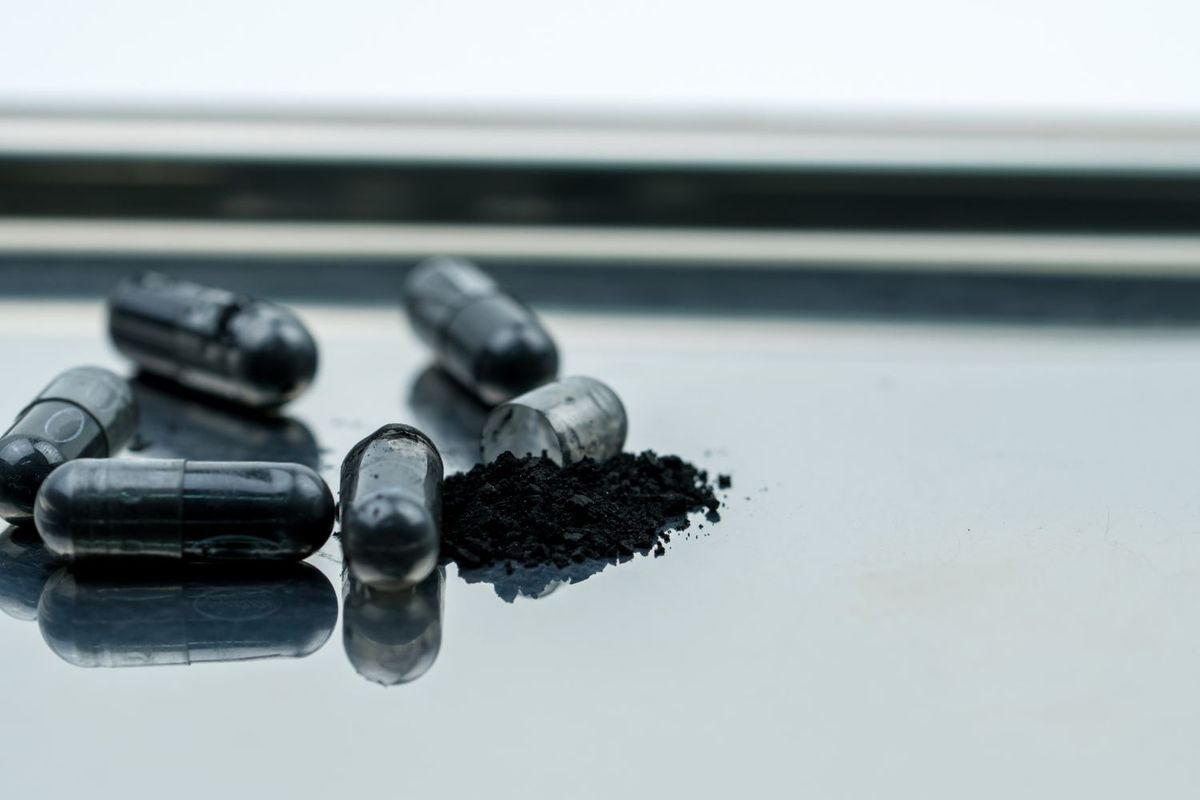Why You Should Take Activated Charcoal Before Bed

For those of us seeking better sleep and overall well-being, taking activated charcoal before bed may be a beneficial addition to our nightly routines.
Activated charcoal has been known to provide numerous health benefits, thanks to its unique toxin-absorbing properties.
This natural remedy works by trapping toxins and chemicals in its millions of tiny pores, preventing our bodies from absorbing them.
According to Dr. Brian Lum, taking activated charcoal at night can help lower histamine and alleviate symptoms associated with high histamine levels during sleep. This can lead to improved sleep and reduced nighttime awakenings.
Activated charcoal has also been linked to other health benefits such as reducing bloating, improving kidney function, and even reducing cholesterol levels.
Incorporating activated charcoal into our bedtime routines may contribute to overall health and support restful sleep.
But what is activated aharcoal?
What Is Activated Charcoal
Activated charcoal is a fine, odorless, black powder made from various sources such as coal, coconut shells, or wood.
It is processed at high temperatures, which causes the structure to become more porous. This porous structure is what sets activated charcoal apart from regular charcoal and gives it its unique properties.
As a supplement, activated charcoal is known for its ability to bind to certain substances, such as toxins and unwanted chemicals. This binding process is called adsorption, and it is what makes activated charcoal so valuable in various applications, including emergency treatment for poisoning.
Activated charcoal can trap the toxic substances in the gut, preventing their absorption into the body and reducing their harmful effects (Healthline).
How Activated Charcoal Works
Activated charcoal's porous texture and large surface area make it highly effective in trapping and binding various substances, including toxins and gases.
The large surface area of activated charcoal is a result of its porous nature. It allows it to bind with a wide array of molecules, making it extremely effective in adsorbing toxins and other unwanted substances. In fact, just one gram of activated charcoal can have a surface area of up to 3,000 square meters (Healthline).
When we ingest activated charcoal, it travels through our digestive system and binds with various other particles. Due to its negative charge, activated charcoal is particularly effective at capturing positively charged particles, such as certain toxins and gases. Once these molecules are bound to the activated charcoal, they are no longer absorbed by our body and are eventually eliminated through our natural digestive process.
Incorporating activated charcoal into our routine, such as taking it before bed, can offer a wide range of potential benefits and support overall well-being.
Activated Charcoal Sources and Dosage
Activated charcoal can be derived from different materials, such as coconut shells or wood. The most common source of activated charcoal is coconut shells, as it is a high-quality and sustainable option.
Activated charcoal is available in various forms, including capsules, tablets, and powder.
You can get activated charcoal in powder form but any spillage can get quite messy (remember it is a very fine black powder) so perhaps capsules or tablets are a safer bet.
For detoxification purposes, adults should take 1 capsule or tablet (usually 200-300 mg) before bed and at least 2 hours before or after taking any other medicine.
Activated charcoal is generally safe when used topically in skincare products or orally with proper guidance.
Benefits of Taking Activated Charcoal Before Bed
General Detoxification
By taking activated charcoal before bed, we can provide our body with a natural detoxification process that can rid us of potentially harmful substances we may have ingested throughout the day [source].
Reduced Bloating
Bloating can be an uncomfortable issue for many people, especially at night. Activated charcoal has been shown to effectively bind to and reduce accumulated gas in our digestive system. By reducing bloating and gas before bedtime, we can feel more at ease and comfortable as we drift off to sleep [source].
Better Heart Health
Taking activated charcoal before bed may also have positive effects on our heart health by lowering cholesterol levels. Regular consumption of activated charcoal can help remove excess cholesterol and bile acids from the body, potentially resulting in a healthier cardiovascular system and reducing the risk of heart-related issues [source].
Anti-Aging Benefits
Activated charcoal not only helps detoxify our body but may also have anti-aging benefits. By binding to and removing harmful toxins and free radicals from our cells, we can help promote a healthier, more youthful appearance. Incorporating activated charcoal into our nightly routine can be a natural way to support our body's ability to maintain a vibrant, youthful state [source].
Medication Interactions
Since activated charcoal binds to various substances in our gut, it can also bind to medication taken at the same time or shortly before or after taking activated charcoal.
This may reduce or prevent medication absorption, potentially causing medication's effectiveness to diminish.
That's why it is important to take activated charcoal at least 2 hours before or after taking other medicines by mouth such as birth control pills, antidepressants, multivitamins, or any other medication.
It is important to consul a healthcare provider if you plan to take activated charcoal routinely, especially if you're taking any medications, supplements, or vitamins.
Other Uses of Activated Charcoal
Cosmetic Applications
Activated charcoal is often used in cosmetics, thanks to its ability to draw microparticles like dirt, dust, chemicals, toxins, and bacteria to the skin's surface, making them easier to remove Medical News Today. By using products containing activated charcoal, we may benefit from its adsorptive properties, which can improve the overall appearance of our skin.

Toothpaste and Oral Care
Incorporating activated charcoal into toothpaste and oral care products has been growing in popularity. It's believed to have tooth whitening properties by binding to surface stains and removing them during brushing Healthline. While using activated charcoal for oral care, it's essential to choose a product explicitly designed for this purpose to avoid any adverse effects on tooth enamel or gum health.
Hangover Prevention
It's believed that taking activated charcoal before bed could help prevent a hangover as it can adsorb some of the toxins associated with alcohol consumption. Early research on using activated charcoal to prevent hangovers indicates that it could be an effective means to avoid the unpleasant side effects of drinking too much. However, further studies are needed to confirm these findings conclusively.
Gut Health Support
Activated charcoal can play a role in supporting our gut health. The adsorptive properties of activated charcoal may help reduce inflammation, gas, and bloating in our gastrointestinal system. It can bind to various substances that cause discomfort, such as toxins and bacteria, and help with stool consistency in cases of diarrhea WebMD. By taking activated charcoal before bed, we may awaken to a more balanced and supported gut.
Potential Risks and Side Effects
While activated charcoal is known for its detoxifying properties, it is important to be aware of the potential risks and side effects associated with its use before deciding to incorporate it into your nightly routine.
One of the known side effects of activated charcoal consumption includes gastrointestinal issues, such as constipation.
That's why it is important to start with a small dose and build from there to avoid any undesirable side effects.
Some people may also experience minor side effects like black stools and black tongue. These may be unpleasant but they do not present any health risks.
But always make sure to consult with a healthcare professional before making significant changes to your daily routine, and ensure that you are well informed about any potential consequences.


